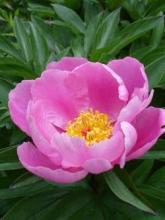A Chinese herbal medicine preparation may offer relief from constipation symptoms in individuals with irritable bowel syndrome.
A randomized, placebo-controlled trial in 125 individuals with constipation-predominant irritable bowel syndrome (IBS-C) showed the preparation was associated with significant improvements, compared with placebo.
In the per-protocol analysis, 68% of patients given the herbal medicine reported achieving adequate relief from their symptoms, compared with 43% of the placebo group (P = .10), according to a paper published online in Clinical Gastroenterology and Hepatology.
Patients were randomized to receive either a standardized extract of seven Chinese herbal medicine ingredients in capsule form – five capsules taken twice daily – or a taste- and color-matched placebo for 8 weeks, with further follow-up at 16 weeks.
The herbal ingredients included extracts of Chinese peony (Paeonia lactiflora), Seville orange (Citrus aurantium), Magnolia officinalis, and Chinese licorice (Glycyrrhiza uralensis), which were used for their antispasmodic effects, as intestinal muscle relaxants, and as myorelaxants.
The authors commented that while there are recent advances in the treatment of irritable bowel syndrome – such as the serotonergic agent prucalopride, chloride channel activator lubiprostone, and guanylate cyclase–C activator linaclotide – there is not yet a single drug regimen that shows efficacy for the many symptoms of IBS or addresses the high rate of symptom return.
In the study, patients treated with the herbal preparation showed improved bowel habits at the end of treatment, including significantly lower IBS Symptom Severity Scale scores, reduced straining during defecation, a decrease in hard, lumpy stools, and increased stool consistency.
“Although there were significant results for participants in the treatment group, to gain adequate benefit they needed to remain on treatment,” wrote Dr. Alan Bensoussan of the National Institute of Complementary Medicine at the University of Western Sydney (Australia) and his coauthors.
However, the study did not find any statistically significant differences between the intervention and placebo arm in overall IBS-related quality of life, abdominal pain, or bloating at the end of treatment (Clin. Gastroenterol. Hepatol. 2015 Jun 29. doi:10.1016/j.cgh.2015.06.022).
“Thus, IBS-C participants appeared to interpret more normal bowel functions as a significant improvement in the condition, but [quality of life] may only improve when pain and bloating are also substantially ameliorated,” the authors wrote.
Researchers said this finding supports recently published data suggesting that improving bowel movements is a higher priority for patients with IBS-C than pain relief.
Although patients were asked to discontinue related treatment such as anticholinergic agents, opioid analgesics, and regular laxatives, they were allowed some rescue medication.
There was a nonsignificantly greater use of bulking agents in the Chinese herbal medicine group, and stimulant laxative use in the placebo group.
The study medication was generally well tolerated, although there were twice as many gastrointestinal adverse events reported in the intervention group as in the control group.
Overall, there were 19 withdrawals from the study, 6 of which were potentially associated with the study drug; the reasons included diarrhea, blood in the urine, increased bloating, and dizziness.
The study was supported by the National Health and Medical Research Council, and there were no conflicts of interest reported.



